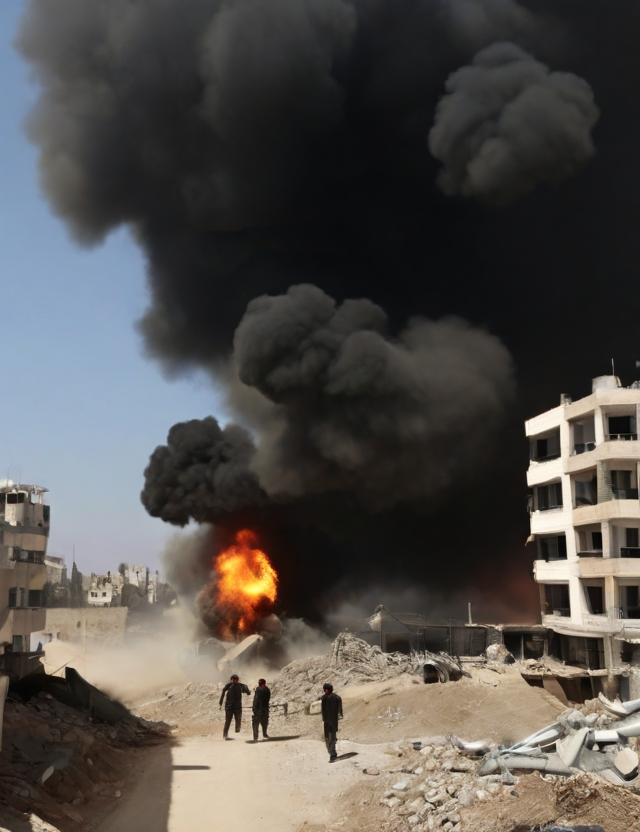Israel Stages Airstrikes Across Gaza, Makes Arrests at Hospital
Introduction
In recent developments, Israel has initiated airstrikes across Gaza while also making arrests at a hospital, sparking international concern and condemnation.
Israel’s Airstrikes in Gaza
The airstrikes in Gaza are believed to be in response to ongoing tensions and escalations in the region. Israel cites security concerns and the need to protect its citizens from threats originating in Gaza as reasons behind these airstrikes. However, the strikes have resulted in significant damage to infrastructure and civilian casualties, exacerbating the humanitarian crisis in the Gaza Strip.
Arrests at Hospital
Reports of arrests at a hospital have further intensified the situation. Israeli forces allegedly detained individuals, including medical personnel, at a hospital in Gaza, raising serious questions about the respect for medical neutrality and the right to healthcare in conflict zones. The international community has expressed outrage at these actions, calling for immediate investigations and accountability.
Humanitarian Concerns
The airstrikes and arrests have raised grave humanitarian concerns. Civilians, including women and children, bear the brunt of the violence, facing displacement, injuries, and loss of life. Such actions also violate international humanitarian law, which mandates the protection of civilians and essential services during armed conflict.
Criticism and Support
The international community has been divided in its response to these events. While some nations have condemned Israel’s actions as disproportionate and indiscriminate, others have voiced support for Israel’s right to self-defense. This polarization underscores the complexities of the Israel-Palestine conflict and the challenges of achieving consensus on a path towards peace.
Efforts for Peace
Diplomatic efforts are underway to de-escalate tensions and prevent further bloodshed. Various stakeholders are engaged in dialogue and mediation initiatives to find a peaceful resolution to the conflict. However, deep-rooted grievances and distrust between the parties involved present formidable obstacles to progress.
Media Coverage
Media coverage of the events has been varied, with different outlets presenting contrasting narratives and interpretations. Propaganda and biases often influence the portrayal of the conflict, shaping public perceptions and attitudes towards the parties involved. Critical analysis of media coverage is essential for understanding the complexities of the situation.
Historical Context
The current events must be understood within the broader historical context of the Israel-Palestine conflict. Decades of unresolved territorial disputes, displacement, and violence have fueled deep-seated animosities and grievances, perpetuating a cycle of conflict and suffering.
Legal Ramifications
From a legal standpoint, the airstrikes and arrests raise serious concerns regarding compliance with international law. Allegations of war crimes and violations of human rights demand thorough investigations and accountability mechanisms to ensure justice for the victims and prevent future atrocities.
Impact on Regional Stability
The escalation of violence in Gaza has implications for regional stability and security. The conflict has the potential to spill over into neighboring countries, exacerbating tensions and instability across the Middle East. Regional actors must exercise restraint and work towards de-escalation to avoid further destabilization.
Role of International Community
The international community has a crucial role to play in addressing the Israel-Palestine conflict. Calls for intervention, diplomacy, and peacekeeping efforts underscore the need for collective action to promote dialogue, reconciliation, and lasting peace in the region. The United Nations, in particular, has a responsibility to uphold international law and support initiatives for conflict resolution.
Public Opinion
Public opinion on the conflict varies widely, reflecting diverse perspectives and narratives. Social media platforms amplify voices from all sides, shaping public discourse and mobilizing support for different causes. Civil society plays a vital role in advocating for peace, human rights, and justice for all affected by the conflict.
Long-term Solutions
Achieving a sustainable peace in the region requires addressing the underlying causes of the conflict. This includes addressing issues of land rights, refugees, security, and governance through inclusive dialogue and negotiations. Only through a comprehensive and inclusive approach can lasting peace and stability be achieved in the Middle East.
Conclusion
The recent airstrikes in Gaza and arrests at a hospital underscore the urgent need for a peaceful resolution to the Israel-Palestine conflict. The international community must redouble its efforts to promote dialogue, respect for human rights, and compliance with international law to prevent further escalation of violence and suffering.
FAQs
- Q: What sparked the recent airstrikes in Gaza? A: Tensions and escalations in the region are believed to have prompted Israel’s airstrikes in Gaza.
- Q: Why were arrests made at a hospital? A: Israeli forces allegedly detained individuals, including medical personnel, at a hospital in Gaza, sparking international condemnation.
- Q: How is the international community responding to the events? A: Responses vary, with some nations condemning Israel’s actions and others voicing support for its right to self-defense.
- Q: What are the long-term solutions to the Israel-Palestine conflict? A: Long-term solutions require addressing root causes through inclusive dialogue, negotiation, and respect for international law.
- Q: What role does the media play in shaping perceptions of the conflict? A: Media coverage varies widely, reflecting diverse narratives and biases, influencing public opinion and attitudes towards the conflict.



